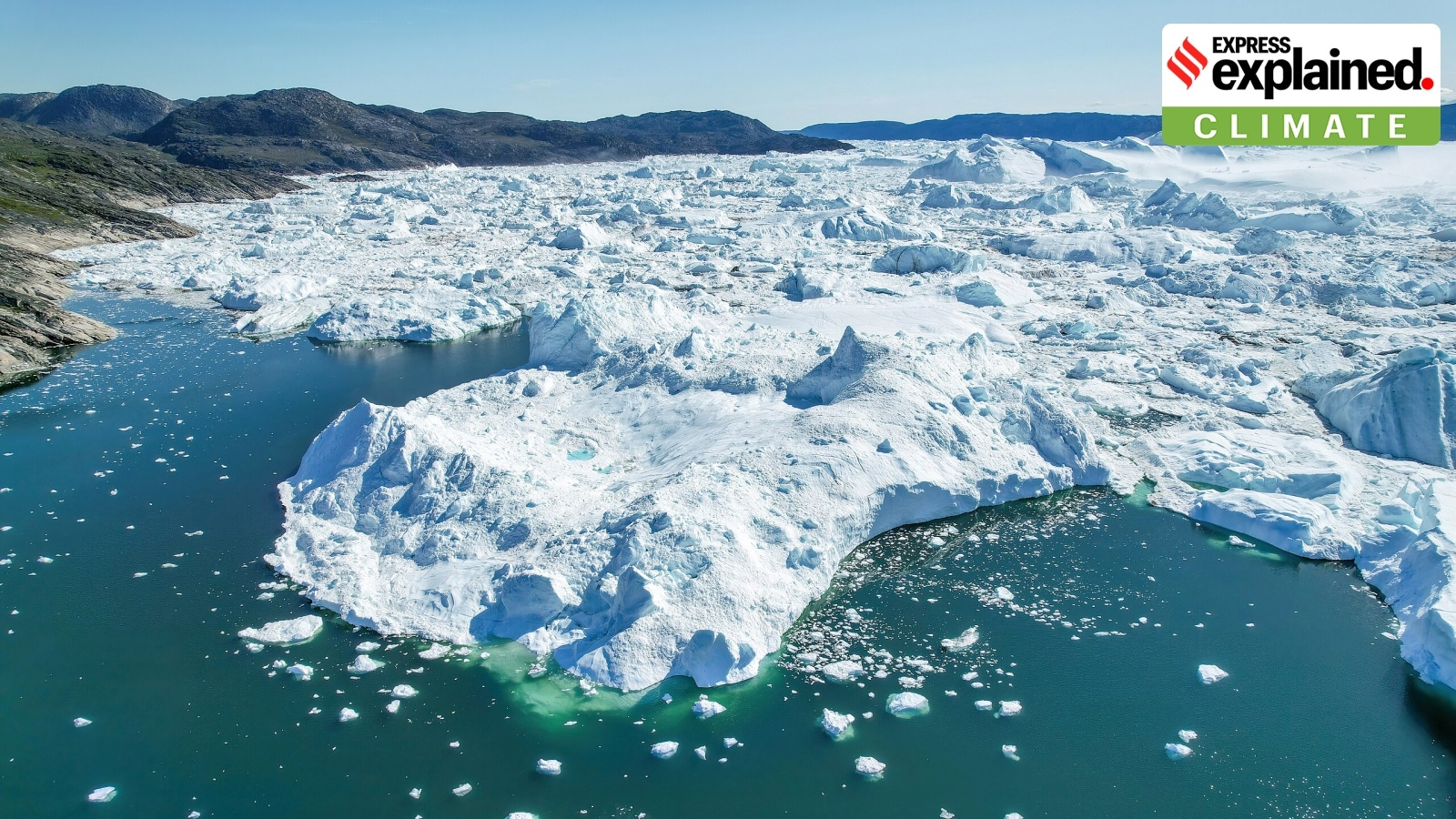Collapse of critical Atlantic current is no longer low-likelihood: What a new study says
The analysis has said the tipping point that makes an Atlantic meridional overturning circulation (AMOC) shut down inevitable could be breached within a few decades. However, the collapse of the current itself may not happen until 50 to 100 years later
 Aerial view of Jakobshavn Glacier at Disko Bay, Greenland. (Photo: Wikimedia Commons)
Aerial view of Jakobshavn Glacier at Disko Bay, Greenland. (Photo: Wikimedia Commons)A new study has found that the collapse of a critical Atlantic current should not be considered a low-likelihood event anymore. The analysis has said the tipping point that makes an Atlantic meridional overturning circulation (AMOC) shut down inevitable could be breached within a few decades. However, the collapse of the current itself may not happen until 50 to 100 years later.
The study, ‘Shutdown of northern Atlantic overturning after 2100 following deep mixing collapse in CMIP6 projections’, was published in the journal Environmental Research Letters on Thursday (August 28).
Previous studies have shown that the Amoc is already at its weakest in 1,600 years due to the climate crisis. Stefan Rahmstorf, researcher at Potsdam Institute for Climate Impact Research and co-author of the study, told The Guardian that the new results were “quite shocking, because I used to say that the chance of AMOC collapsing as a result of global warming was less than 10%”.
What is AMOC?
The AMOC is a large system of ocean currents. It is the Atlantic branch of the ocean conveyor belt or thermohaline circulation (THC), and it distributes heat and nutrients throughout the world’s ocean basins.
AMOC carries warm surface waters from the tropics towards the Northern Hemisphere, where it cools and sinks. It then returns to the tropics and then to the South Atlantic as a bottom current. From there, it is distributed to all ocean basins via the Antarctic circumpolar current.
What happens if AMOC collapses?
Gulf Stream, a part of the AMOC, is a warm current responsible for the mild climate on the Eastern coast of North America as well as Europe. Without a proper AMOC and Gulf Stream, Europe will be very cold.
Modelling studies have shown that an AMOC shutdown would cool the northern hemisphere and decrease rainfall over Europe. It can also affect the El Niño.
A 2016 paper in Science Advances noted: “AMOC collapse brings about large, markedly different climate responses: a prominent cooling over the northern North Atlantic and neighbouring areas, sea ice increases over the Greenland-Iceland-Norwegian seas and to the south of Greenland, and a significant southward rain-belt migration over the tropical Atlantic.”
Why is the AMOC slowing down?
According to researchers, freshwater from melting Greenland ice sheets and the Arctic region can make circulation weaker as it is not as dense as saltwater and doesn’t sink to the bottom.
A 2019 study suggested that the Indian Ocean may also be helping the slowdown of AMOC. The researchers said: As the Indian Ocean warms faster and faster, it generates additional precipitation. With so much precipitation in the Indian Ocean, there will be less precipitation in the Atlantic Ocean, leading to higher salinity in the waters of the tropical portion of the Atlantic. This saltier water in the Atlantic, as it comes north via AMOC, will get colder much quickly than usual and sink faster.
“This would act as a jump start for AMOC, intensifying the circulation,” author Alexey Fedorov said in a press release. “On the other hand, we don’t know how long this enhanced Indian Ocean warming will continue. If other tropical oceans’ warming, especially the Pacific, catches up with the Indian Ocean, the advantage for AMOC will stop.”
“If we continue to drive global warming, the Gulf Stream System will weaken further – by 34 to 45 per cent by 2100 according to the latest generation of climate models,“ noted Rahmstorf. “This could bring us dangerously close to the tipping point at which the flow becomes unstable.”
- 01
- 02
- 03
- 04
- 05






































